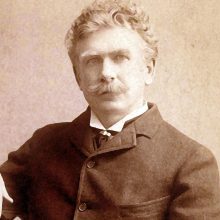Ambrose Bierce

Ambrose Gwinnett Bierce was born on June 24, 1842, in Meigs County, Ohio, the tenth of thirteen children in a poor but book-loving family. He grew up in Indiana and left home as a teenager to work as a printer’s apprentice before enrolling at the Kentucky Military Institute.
When the American Civil War broke out, Bierce enlisted in the Union Army. He served with distinction in the 9th Indiana Infantry, taking part in some of the war’s bloodiest battles, including Shiloh and Chickamauga. His wartime experiences deeply shaped his later writings, often infusing them with dark realism and cynicism about human nature.
After the war, Bierce settled in San Francisco, where he became a journalist, satirist, and short story writer. He gained fame for his sharp wit and biting criticism. His most enduring works include:
“Tales of Soldiers and Civilians” (1891), later published as In the Midst of Life, a collection of grim short stories often set during the Civil War.
“The Devil’s Dictionary” (1906), a satirical lexicon redefining common words with cynical humor.
Short stories such as “An Occurrence at Owl Creek Bridge”, which remains one of the most anthologized American short stories.
Bierce was known as “Bitter Bierce” for his sardonic view of human folly. His writing blends dark irony, psychological depth, and stark realism, often dwelling on death, futility, and the brutality of war. His journalism also skewered corruption, hypocrisy, and incompetence in public life.
In 1913, at age 71, Bierce traveled to Mexico during its revolution, possibly to witness Pancho Villa’s campaign. He vanished without a trace, and his fate remains one of American literature’s great mysteries. The last known correspondence from him ends with the chilling words: “As to me, I leave here tomorrow for an unknown destination.”
Ambrose Bierce is remembered as one of America’s most distinctive literary voices—a master of the short story, a pioneer of dark satire, and a war veteran whose writings still resonate with readers for their stark portrayal of life’s absurdities and tragedies.
